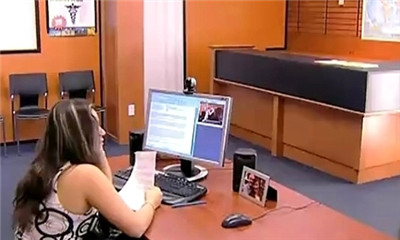(单词翻译:单击)
One of the most unsettling workplaces I have ever come across was a pub in the English Midlands I visited 12 years ago. It was nothing to do with the licensee of the Pig & Truffle in Rugby, an enterprising man called Mike Trow, who brought in some fine real ales.
12年前,我去过英格兰中部的一家酒吧,那是我见过的最令人不安的工作场所之一。这家位于拉格比的酒吧名叫“猪与松露”(The Pig & Truffle),老板叫迈克•特罗(Mike Trow),是一个很有进取心的人,卖一些上好的传统酿造啤酒。他并不是我感到不安的原因。
Instead, the uneasiness I felt stemmed from something lurking in his cellar. Attached to the pipes that sent beer up to the bar was spy equipment introduced by Punch Taverns, a company whose flotation I was covering. Punch was both renting the pub to Mr Trow and selling him all his beer at above-market rates.
实际上,他地窖里的某些东西才是不安的来源。往上输送啤酒的管子上安着Punch Taverns的监控设备。我当时正在报道这家公司上市的消息。Punch一方面将酒吧租给特罗,另一方面以高于市价的价格向其独家供应啤酒。

The kit measured how much lager and bitter was flowing through the Pig & Truffle’s taps to ensure that he was not breaking this onerous exclusive supply deal by buying from a cheaper wholesaler: something that could have led to Mr Trow’s family being booted out of the pub and their home.
这个设备是用来检测“猪与松露”的龙头流出了多少淡啤和苦啤,以防特罗违反这个义务繁多的独家供货协议,从价格较低的批发商那里买酒:违反协议可能使特罗和他的家人失去这间酒吧和他们的家。
There was something odd about the bottles of Holsten Pils too: instead of the usual green top, they had a red one. This was another way Punch exerted Big Brother-style control over its publican “partners”, who bore most of the day-to-day trading risk. The Pig & Truffle would have been in trouble if it had been caught selling cheaper green-top Holsten.
那里售卖的Holsten Pils啤酒的瓶子也有奇怪的地方:和平常的绿盖不同,这些瓶子上是红盖。这是Punch对它的“伙伴”酒店老板施加“老大哥”式控制的另一种方式,承担大部分日常运营风险的也是这些酒店老板。如果“猪与松露”被发现售卖更便宜的绿盖Holsten Pils啤酒,就会有麻烦。
I’ve been thinking of Mr Trow recently — and the way his story ties in with broader workplace trends — because of a surprising development in the pub sector. British MPs last month voted to undo the “beer tie”, the legal quirk that permits such a lopsided landlord-tenant arrangement.
由于酒吧业的一个惊人发展,我最近一直在思考特罗的故事,他的故事契合了一种更广泛的工作场所变化趋势。英国议会上月投票取消“啤酒捆绑令”(Beer Tie,译注:大酒吧公司向租入酒吧的店主独家供应啤酒的安排),正是这种奇怪的法律造成了如此不平等的租赁协议。
The reform, allowing more publicans to buy cheaper beer from third parties, still has to be passed into law but it has already hit the share prices of some in the sector. For example, Vianet, which installed the Pig & Truffle’s beer flow monitor for Punch, suffered a 16 per cent share price decline in the two trading days after the vote.
这项改革使更多酒吧老板能从第三方购入更便宜的啤酒,虽然还未通过变成法律,但已经冲击了一些酒吧业内企业的股价。比如,为Punch在“猪与松露”酒吧安装啤酒流量监控器的公司Vianet,在议会投票后的2个交易日内股价下跌了16%。
The sudden stiffening of parliamentary resolve after years of inaction is fantastic news, even though it has come too late for Mr Trow, who quit the pub trade years ago and now runs a mobile catering outlet. Punch, meanwhile, is a shadow of its former self and has had to renegotiate the debt it took on during its go-go years.
在多年毫无动作后,议会突然坚定了决心,这是一个极好的消息,尽管对特罗来说来得太晚。几年前他就已经放弃了酒吧生意,现在经营着一家流动餐饮店。与此同时,Punch也好景不再,不得不对其繁盛时期欠下的债务进行重新谈判。
But as desirable as it might be, the dismantling of spy equipment in pub cellars up and down the country would be somewhat at odds with the spirit of the age. Offices, in particular, are becoming havens for monitoring equipment with varying levels of intrusiveness.
尽管这件事似乎值得一做,在全国上下的酒吧地窖拆除监控设备的行动却与时代精神有点格格不入。尤其是,办公室正变成各种侵入性程度不一的监控设备的安身之所。
My colleague Hannah Kuchler in San Francisco wrote a terrific feature earlier in the year about the likes of Sociometric Solutions, which puts sensors in name badges to discover social dynamics at work, monitoring how employees move around the office, who they talk to and even what tone of voice they use.
今年早些时候,我在旧金山的同事汉娜•库赫勒(Hannah Kuchler)写了一篇关于Sociometric Solutions那类公司的好文章。Sociometric Solutions在企业客户的员工姓名牌上安装传感器,以了解员工工作时的社交活动,监测员工在办公室里的走动路线、交谈对象,甚至说话的语气。
Another US manufacturer she profiled, Steelcase, puts sensors in office furniture and argues that the technology is now so cheap that it can be deployed “practically everywhere”.
她概述的另一家美国制造商Steelcase,在办公家具上安装了传感器,称这种技术造价非常低廉,所以“基本上任何地方”都可以采用。
I’ve recently been contacted by a thriving UK-headquartered company calledCondeco Software, whose products include wireless “workplace occupancy sensors” that track movement to assess how much desks and meeting rooms are being used.
最近,一家总部设在英国的企业Condeco Software联系到了我。这家企业正在蓬勃发展,产品包括无线“工作场所占用传感器”,能够追踪人的移动情况,以估算有多少桌子和会议室正在使用。
Its promotional video for the product carries a whiff of sci-fi dystopia, showing the black gadgets stuck on the underside of desks like clunky bugging devices (or malign air fresheners), although I guess the aesthetics should improve under a new partnership it is set to agree with a manufacturer that would embed the sensors inside desks.
该产品的宣传视频有一丝反乌托邦科幻小说的味道,视频里固定在桌子底部的黑色部件看上去像是笨重的窃听器(或者看上去不怀好意的空气清新器)。不过,这家公司即将和另一家制造商达成新的合作关系,我猜之后他们应该会提升产品美感,把传感器嵌入到桌子里。
But Paul Statham, Condeco founder and chief executive, makes a strong case for why such technology is a good thing for companies, and maybe even staff.
但Condeco的创始人兼首席执行官保罗•斯泰瑟姆(Paul Statham)阐述了强有力的理由,说明为什么这种技术对企业是一件好事,甚至对员工来说也可能也是如此。
The rise of flexible working has left some companies with unproductively configured space: perhaps too many old-fashioned rows of desks and not enough lounge areas and quiet zones to cater for homeworkers popping in.
弹性工作制的兴起使一些公司的空间配置失去了用武之地:要吸引在家工作的人,公司有太多一排排的老式桌椅,休息区和安静区也不够。
Condeco’s clients, who include Barclays and General Electric, are not interested in using the technology to monitor whether someone steps away for too many cigarette breaks, says Mr Statham: “It is not a time and motion study. This is not about monitoring people.”
Condeco的客户包括巴克莱银行(Barclays)和通用电气(General Electric),对使用这种技术来监控员工出去抽烟休息的次数是否太多,这些客户并不感兴趣,斯泰瑟姆说:“这不是时间和移动研究。这与监控人无关。”
There is an argument that the wave of office monitoring devices may not much alter the balance of power between employee and employer, given how easy it is to track internet and smartphone use already.
还有一种主张,称办公室监控设备的潮流或许不会从根本上动摇雇员和雇主之间的权力平衡,因为现在追踪互联网和智能手机的使用非常简单。
Inevitably, though, there will be managers who use sensors as a cynical command-and-control tool. In such cases, investors should bear in mind that it is a second-rate company that has to spy on its allies to make its business model work — as the sorry saga of Punch has shown.
然而,不可避免地会有经理把传感器作为一种体现怀疑姿态的命令和控制工具。在这种情况下,投资者应该记住一点,正如Punch令人遗憾的故事展现出来的那样,需要监视合作伙伴才能让商业模式运作的是二流企业。


